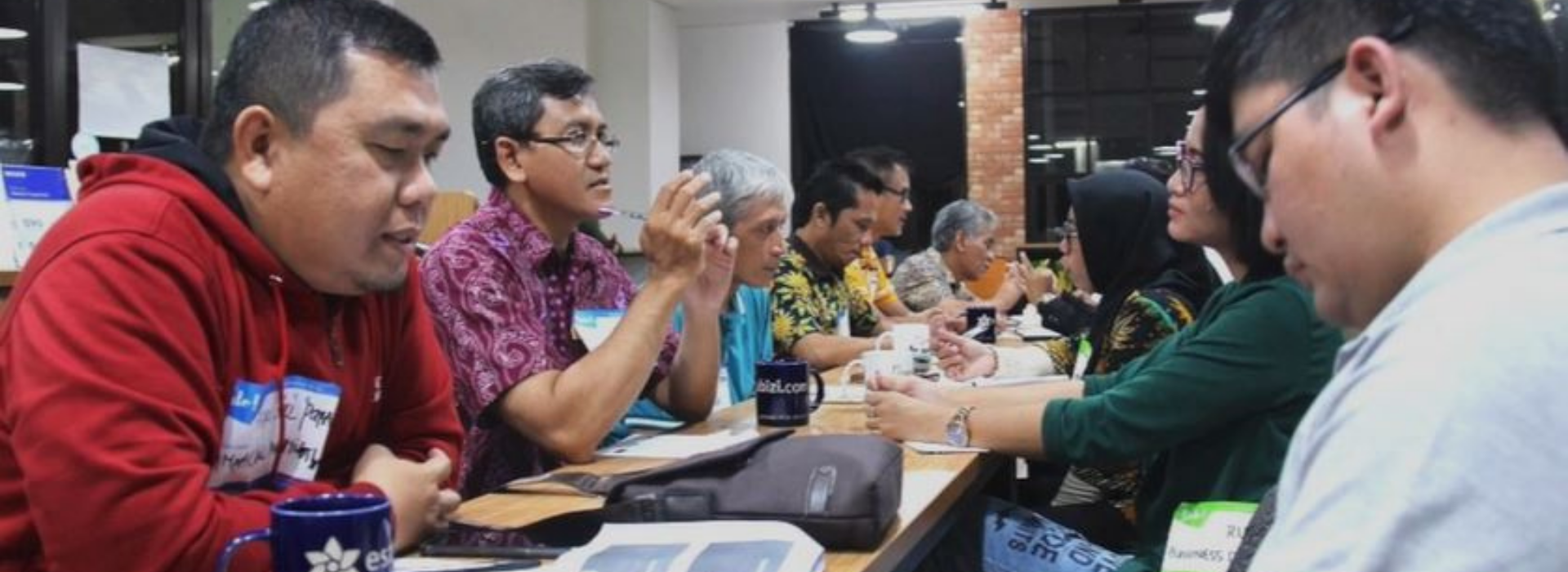In Indonesia, mentors are helping turn entrepreneurial spirit into business success
October 27, 2021 | By Sophie Hares
In 2017, Andi Ashar needed to earn some extra money to pay for his studies in information systems at his university in Makassar, on the Indonesian island of Sulawesi. He heard about a contest sponsored by an international mining company for the best infographic design and decided to try his luck. He was amazed when he won first place, earning him the $1,750 prize.
Ashar decided to use the money to start his own T-shirt screen-printing business, Keraton Kaos. He quickly attracted a base of new customers but then hit a wall. Unable to motivate his staff to take more initiative, he shouldered many daily responsibilities himself, and as his business grew, his finances became increasingly difficult to handle.
“Learning how to screen-print the T-shirts by hand was one thing,” says Ashar, now 26. “But running the business was a completely different type of challenge. There was a definite learning curve.”
Around this time, Ashar spotted an advertisement about Mercy Corps’ MicroMentor Indonesia program. He immediately signed up, hopeful he could find a mentor to show him the ropes of managing a small business.
Ashar’s experience is not uncommon. Before the pandemic hit, more than a third of young adults in Indonesia wanted to run their own businesses, according to a World Economic Forum survey of youth attidues in the region. But while the number of startups has boomed in Southeast Asia’s largest economy, young entrepreneurs with little business experience have struggled to persuade would-be investors to provide the capital they need to grow.

On the country’s thousands of smaller islands — outside of the main islands of Java and Sumatra — starting a new business can be even more challenging. There is very little support available for young entrepreneurs, and they often face connectivity and infrastructure issues. On top of that, cybercrime is a grave and growing threat worldwide.
MicroMentor Indonesia’s digital platform, with inaugural support from the Mastercard Center for Inclusive Growth, is reaching these entrepreneurs by training thousands of volunteers to become their mentors and by providing cybersecurity tools and digital instruction. The platform has been endorsed by the country’s Ministry of Cooperatives and Small and Medium Enterprises for its effective approach to expanding support to 65 million micro, small and medium-sized businesses throughout the archipelago.
“Digital transformation is important for the economic recovery of MSMEs during the pandemic,” says Teten Masduki, who leads the Indonesian ministry. The number of these businesses that have connected to the digital ecosystem has nearly doubled during the pandemic, from 8 million to 15.9 million, with the government targeting 30 million by 2024, he says. “This means that our focus is now on how to accelerate the digitization for MSMEs.”
MicroMentor Indonesia is part of the broader Mastercard Academy 2.0 initiative to equip 100,000 Indonesians — from schoolchildren and young adults to entrepreneurs and mid-career professionals — with the digital skills they need to succeed in the economies of the future. Mastercard 2.0 includes Girls4Tech, the company’s signature STEM education program for girls 8 to 14; a cybersecurity training and job placement program for vocational students; and an online cybersecurity toolkit from the Global Cyber Alliance that, along with the MicroMentor Indonesia program, will help entrepreneurs like Ashar grow and secure their businesses.
Using the MicroMentor Indonesia platform, Ashar browsed available mentors and came across Ruhaisal Ifna, an entrepreneur and university lecturer based in Makassar, his hometown of 1.4 million.
Like Ashar, Ifna had started her own businesses as a student, first making and selling ice cream, then setting up another company to sell toys. She understood the local market and was full of ideas about how Ashar could tap into the student population and find new ways to grow Keraton Kaos.
In Ifna, Ashar discovered a kindred spirit who quickly became like a big sister to him. And Ifna cherished the chance to share her expertise to help launch the careers of young entrepreneurs in her community.
“The first thing I thought was that I needed to motivate him,” Ifna says. “He was so enthusiastic but was filled with doubt about how to grow his business. He just needed to unlock his potential.”
Working together in the months before the pandemic hit, the two would communicate by WhatsApp and met a couple of times in person to talk about how to develop Keraton Kaos.
Thanks to her guidance, Ashar honed his management skills and got a tighter grip on the company’s finances, which ultimately helped boost revenues for his company. “Even things that may seem little to you as a mentor can have a big impact on other people,” Ifna says.
Before the pandemic, Keraton Kaos employed nine staff members who printed up to 2,000 T-shirts a month with its clients’ designs. The company had also built a strong digital profile through its website as well as social media. That strategy was a lifesaver during the lockdown, because it allowed the company to rely on its online sales.
Now Ashar and Ifna are looking to work together to develop business mentoring in Makassar and help more entrepreneurs capitalize on digital technologies that can take them to markets beyond Sulawesi. “You’re never too young to set up a business,” Ashar says. “If you’ve got a great idea, get started on it as soon as possible.”